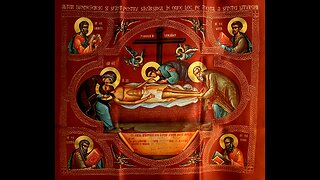In Defense Of The Holy Catholic Orthodox Church
An Orthodox Priest explains why The Protestant Reformation had Good Intentions, but just didn't go far enough...and so remains scattered to the winds, but must be loved.
Rome had rejected The Church 500 years before the Reformation. When the Romans became corrupt, the Protestants, specifically Luther, wrote that he "vigorously defended the Orthodox Church against Eck’s slanderous remarks that the Greek Church had lost the Christian faith after the fall of the Byzantine Empire.” (Mastrantonis, 10 n.1).
"These Lutheran leaders...initiated a conversation with the Patriarch of Constantinople because they believed that the Orthodox Church remained true to the Ecumenical Councils while eschewing the innovations of the Roman church."
The greatest sticking points, however, were those which one would expect: the Lutherans refused to accept the writings of the holy fathers as correctly interpreting the Scriptures unless “tradition agrees with the Scripture”; and the Orthodox refused to accept the Lutherans’ sharply defined understandings of justification and free will. Among these, this criticism by the Lutheran theologians is striking to Orthodox eyes:
It is apparent to us… that you have greater regard for the traditions of the Church which you have received by succession, from hand to hand; and nothing of all that you have inherited from your fathers do you willingly concede…. [S]uch traditions and ethos in the Church… which we understand were in use even at the time of the Apostles in the Early Church… we do not reject at all, but we gladly practice them if indeed they are useful to the needs of our time. (Mastrantonis, 255).
The Patriarch and his advisers were apparently not opposed to conversation and gave no hint that it would tread carefully so as not to offend Roman sensibilities. The Lutherans, on the other hand, too often appear to have read the patriarch’s replies and arguments within the categories and context of their conflict with Rome, rather than supposing that similar language implied similar categories and conclusions.
Most regrettably, neither side apparently attempted to place the doctrinal formulae within a liturgical context by experiencing or understanding each other’s worship. No doubt, that effort alone would have raised other issues—for example, how the Orthodox resolved the apparent conflict between Christ as the only Savior while offering excessive praise to Mary, or how the Lutherans so readily presumed to excise the canon of the mass.
Despite the various shortcomings, the exchange presents a pattern for respectful, humble dialogue which does not brush aside but honestly wrestles with significant differences. It also subtly underlines many areas of agreement between Lutherans and Orthodox which can be the foundation for any well-meaning conversation.
This conversation, I suggest, happens best not on the international level between specially selected representatives, but rather on the local level where the desire is not so much to “negotiate” but to understand and learn from each other in a spirit of mutual respect, as demonstrated by Patriarch Jeremias and the Tübingen theologians,,,
and in a more recent example, Changing Churches by Mickey Mattox and Fr. Anthony (A. G.) Roeber.
-
 5:13
5:13
Decoding God's Time Machine
3 months agoWhy The Catholic Church is the True Church, Part 2: The Sola Scriptura Heresy
17 -
 57:45
57:45
Holy Trinity Romanian American Orthodox Church
4 months agoA brief history of the Eastern Orthodox Church
1.08K -
 28:12
28:12
Sancta Sedes Apostolica - The Holy Apostolic See
3 months agoCondemnation of the Novus Ordo sectarian “liturgy” and heretical fabrications...12 March, 2024 AD
21 -
 4:01
4:01
Dambroca
1 year agoHoly Antimension in the Life of the Orthodox Church
669 -
 3:53
3:53
The Daily Devo by Vince Miller
4 months ago $0.10 earnedThe Defense of an Effective Gospel | Galatians 2:1
116 -
 53:45
53:45
Sancta Sedes Apostolica - The Holy Apostolic See
3 months agoInvalid Sacrament of Penance of the heretics...The Holy See Canons of ANATHEMA...18 March, 2024 AD
21 -
 1:10:26
1:10:26
Sancta Sedes Apostolica - The Holy Apostolic See
5 months agoThe REAL Pope speaks - the Novus Ordo Sectarians, all heretics and suchlike enemies of the Catholic Church...26 January, 2024 AD
36 -
 2:20
2:20
OrthodoxEthos
7 months agoThe Catholic Condemnation of the Filioque
2821 -
 1:06:09
1:06:09
Sancta Sedes Apostolica - The Holy Apostolic See
8 months agoVIDEO - The devil's servants in their heretical false arguments against the Catholic Church's continuity...
66 -
 48:20
48:20
Sancta Sedes Apostolica - The Holy Apostolic See
2 months agoHow God fulfills His promise to protect His Catholic Church against the devil...1 April, 2024 AD
51